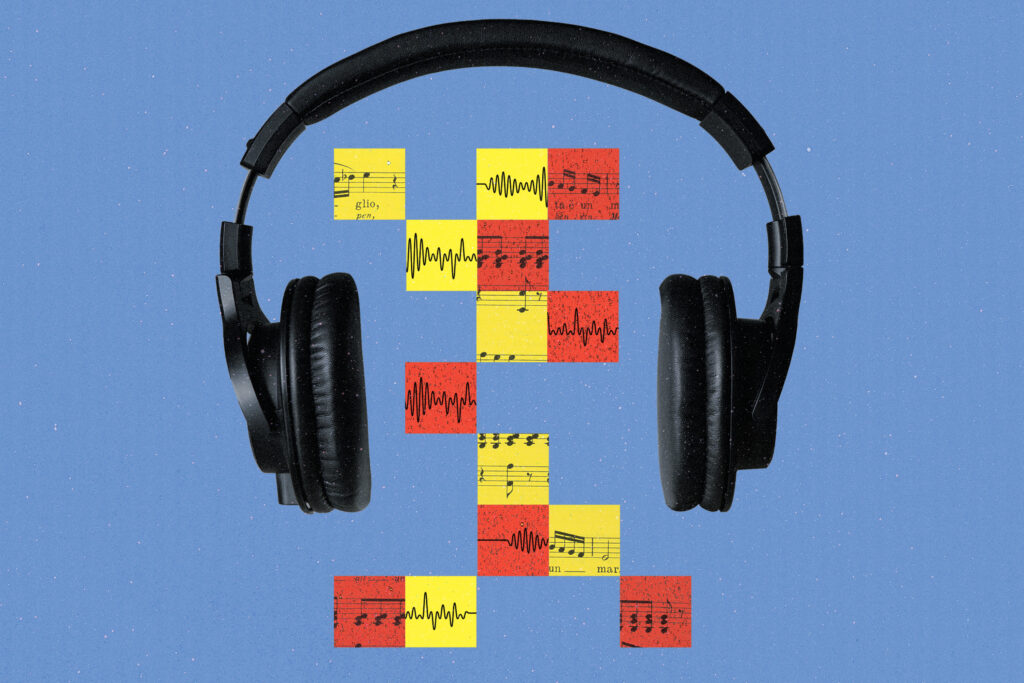For years now, eager musical artists have posted short snippets of songs on TikTok in the hopes of infecting listeners with a viral hit. Just ask Paul Russell, who began teasing his “Best of My Love” rewrite on the platform before his final version, “Lil Boo Thing,” became a double-platinum smash. Or Beabadoobee, who parlayed her covid-era TikTok crowd pleaser “Death Bed (Coffee for Your Head)” into a career as an alt-pop sensation.
British dance act Haven understands how those clips can make new musicians. After it shared teasers of the song “I Run” in October, the track quickly became inescapable on many users’ For You feeds.
There was one problem: Record labels and TikTok users began questioning whether “I Run” used an AI deepfake, modeled off British R&B singer Jorja Smith, for the vocals. Smith confirmed on TikTok that she wasn’t singing on “I Run,” as Haven briefly leaned into the comparison, adding a hashtag on Smith’s name in a now-deleted post.
But the resemblance didn’t last. “I Run” was removed from major streaming services Nov. 14. A spokesman for Spotify told The Washington Post that it was taken down for “violating Spotify’s impersonation policy.” The removal follows Spotify’s September announcement of protections against deceptive content, artist impersonation and spam.
“At its best, AI is unlocking incredible new ways for artists to create music and for listeners to discover it,” Spotify wrote in a blog post. “At its worst, AI can be used by bad actors and content farms to confuse or deceive listeners, push ‘slop’ into the ecosystem, and interfere with authentic artists working to build their careers. That kind of harmful AI content degrades the user experience for listeners and often attempts to divert royalties to bad actors.”
“I Run” has taken off as record labels remain unsure of the extent to which they should welcome generative AI programs such as Suno or Udio into the industry. After the two AI music companies began growing in popularity, the three major labels — Sony Music, Warner Music Group and Universal Music Group — filed lawsuits against Suno and Udio, claiming that the AI companies have used the labels’ sound recordings to train their model. Since then, UMG and Warner have reached agreements to work with Udio, ending their litigation.
This week, Warner announced a licensing deal with Suno, allowing users to create AI-generated songs with the voices and likenesses of Warner artists who opt in to the service. It comes shortly after all three major labels licensed their catalogue to Klay, a music streaming start-up that allows users to adjust songs using artificial intelligence. Major licensing organizations such as ASCAP and BMI shared that they would register songs that were partially AI-generated — but not fully generated ones.
Haven appears to present an uncomfortable edge case. While some AI-generated songs that sound broadly like other artists have been allowed to remain on streaming platforms, the voice in “I Run” appears to have been deemed too duplicative for comfort.
Indeed, the problems for Haven and its song didn’t end with the takedowns: Last Thursday, Billboard reported that Smith’s distribution service, the Orchard, along with two record industry associations issued takedown notices of “I Run,” saying that the song misrepresents another artists — presumably Smith — and is subject to copyright infringement.
Producer Harrison Walker, who with help from Jacob Donaghue leads Haven, confirmed that he used the AI program Suno to make his voice sound like a woman’s on “I Run,” adding in a statement to The Post that they “thank fans for their patience and support,” as Walker and Donaghue attempt to get the song back on streaming platforms.
“It shouldn’t be any secret that I used AI-assisted vocal processing to transform solely my voice for ‘I Run,’” Walker said in a statement to Billboard. “As a songwriter and producer I enjoy using new tools, techniques and staying on the cutting edge of what’s happening. To set the record straight, the artists behind HAVEN. are real and human, and all we want to do is make great music for other humans.”
In response to the takedowns, Broke Records asserted that Haven owns the copyright of “I Run” and has tried to get it re-uploaded to streaming platforms.
“Some of the stuff that’s happening is unprecedented,” Brandon De Oliveira, co-founder of Broke Records, said in an interview with The Post. “We’re still a little bit in the dark and trying to do the right thing by Haven and everybody involved.”
Built on tropical house synths and a drum-and-bass break, “I Run” is centered on a single verse, sung by a feminine voice, about “drowning in the chaos” of life. It wouldn’t be out of place at an exercise class, with its theme of pushing forward, or at a rave with its chopped vocal parts. Walker arrived at the vocals by asking Suno for “soulful vocal samples.”
But his use of an AI program has divided listeners about whether they’re willing to listen to a radio-ready dance song. When Kamyla Gooden, 26, first encountered the song on TikTok, “It was just itching all the right chords,” she told The Post. On TikTok, “you saw it within every four to five scrolls.” Before listening to “I Run,” Gooden wasn’t a fan of electronic dance music at all. “Originally, I first thought it was like, ‘Oh wow, maybe I do like EDM music.’ Then I realized it’s AI, and I’m like, well, now I don’t like it at all!”
Some fully AI-generated artists continue to be a source of curiosity for music listeners. In June, the Velvet Sundown racked up millions of streams on Spotify before sharing that they used AI for their classic-rock sound. Earlier in November, an entirely AI-generated soul artist, Xania Monet, appeared on Billboard’s R&B charts. Another AI-generated gospel artist, Solomon Ray, has accrued over a half-million monthly listeners on Spotify. The chart success of AI songs almost included “I Run,” but it was held from the Billboard charts because of potential legal disputes.
Before it was confirmed that “I Run” was created in part with AI tools, vocalists on TikTok began to post covers of the song. Last Friday, Phoenix singer Kaitlin Aragon posted an a cappella cover of “I Run” to TikTok. Since then, the video received over 700,000 likes. Another cover by former “Love Island” contestant Samira Mighty has been seen over 2 million times.
To get around potential lawsuits, Haven is releasing a rerecording of the song with a human vocalist who might be familiar to those who discovered “I Run” while scrolling on TikTok. Aragon, who was contacted by Haven after her cover went viral, is replacing the original Suno vocals.
“I fell in love with ‘I Run’ the second I first heard it,” Aragon said in a statement to The Post. “So to be asked to sing on the track is really a dream come true. Taking part in this moment is something I’ll carry with me forever.”
The version with Aragon began spreading on TikTok, dividing listeners on whether they preferred the version with AI vocals or her rendition. Finally, this past Friday, the new edit of “I Run” arrived on Spotify and Apple Music.
“Being forced by a bigger industry player to change the song — I don’t know if it’s in their right to do that,” De Oliveira said, adding that there’s going to be more AI music. “The next six months are going to be really interesting because whether people like it or not, this is here.”
The post The music industry is getting used to AI. One viral track went too far. appeared first on Washington Post.




